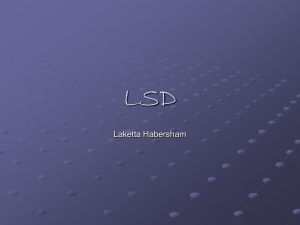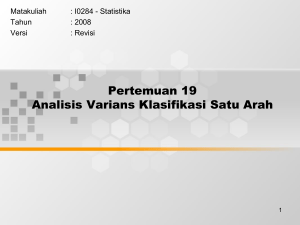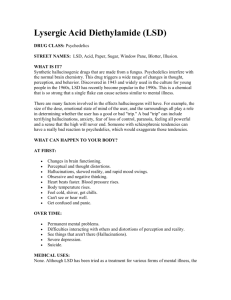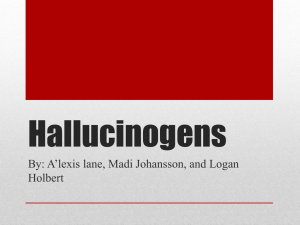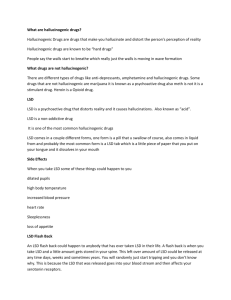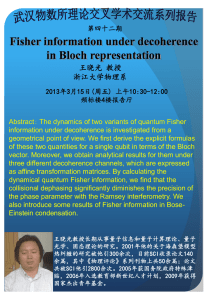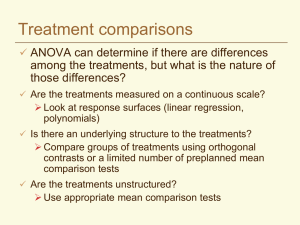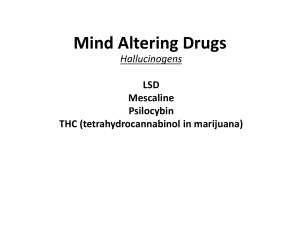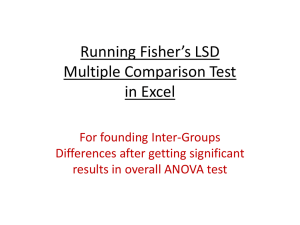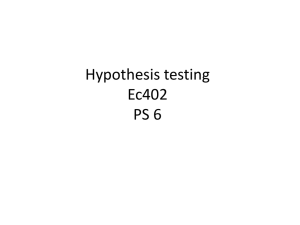Chapter 13
advertisement
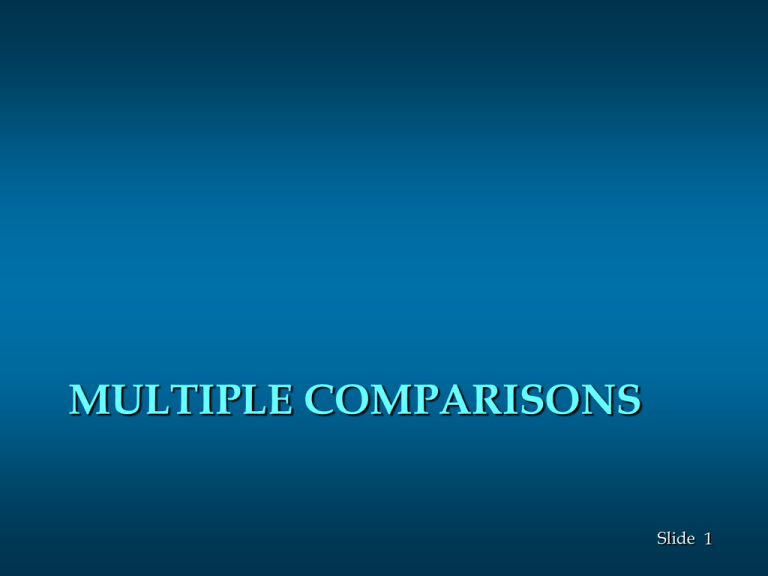
MULTIPLE COMPARISONS Slide 1 Multiple Comparison Procedures Suppose that analysis of variance has provided statistical evidence to reject the null hypothesis of equal population means. Fisher’s least significant difference (LSD) procedure can be used to determine where the differences occur. Slide 2 Fisher’s LSD Procedure Hypotheses H 0 : i = j H a : i j Test Statistic t xi x j MSE( 1 n 1 n ) i j Slide 3 Fisher’s LSD Procedure Rejection Rule p-value Approach: Reject H0 if p-value < a Critical Value Approach: Reject H0 if t < -ta/2 or t > ta/2 where the value of ta/2 is based on a t distribution with nT - k degrees of freedom. Slide 4 Fisher’s LSD Procedure_ _ Based on the Test Statistic xi - xj Hypotheses H 0 : i = j H a : i j Test Statistic xi x j Rejection Rule where Reject H0 if xi x j > LSD LSD ta /2 MSE( 1 n 1 n ) i j Slide 5 Fisher’s LSD Procedure Based on the Test Statistic xi - xj Reed Manufacturing Recall that Janet Reed wants to know if there is any significant difference in the mean number of hours worked per week for the department managers at her three manufacturing plants. Analysis of variance has provided statistical evidence to reject the null hypothesis of equal population means. Fisher’s least significant difference (LSD) procedure can be used to determine where the differences occur. Slide 6 Fisher’s LSD Procedure Based on the Test Statistic xi - xj For a = .05 and nT - k = 15 – 3 = 12 degrees of freedom, t.025 = 2.179 LSD ta /2 MSE( 1 n 1 n ) i j LSD 2. 179 25. 667( 1 5 1 5 ) 6. 98 MSE value was computed earlier Slide 7 Fisher’s LSD Procedure Based on the Test Statistic xi - xj LSD for Plants 1 and 2 • Hypotheses (A) • Rejection Rule H 0 : 1 = 2 H a : 1 2 Reject H0 if x1 x2 > 6.98 • Test Statistic x1 x2 = |55 68| = 13 • Conclusion The mean number of hours worked at Plant 1 is not equal to the mean number worked at Plant 2. Slide 8 Fisher’s LSD Procedure Based on the Test Statistic xi - xj LSD for Plants 1 and 3 • Hypotheses (B) • Rejection Rule H 0 : 1 = 3 H a : 1 3 Reject H0 if x1 x3 > 6.98 • Test Statistic x1 x3 = |55 57| = 2 • Conclusion There is no significant difference between the mean number of hours worked at Plant 1 and the mean number of hours worked at Plant 3. Slide 9 Fisher’s LSD Procedure Based on the Test Statistic xi - xj LSD for Plants 2 and 3 • Hypotheses (C) • Rejection Rule H 0 : 2 = 3 H a : 2 3 Reject H0 if x2 x3 > 6.98 • Test Statistic x2 x3 = |68 57| = 11 • Conclusion The mean number of hours worked at Plant 2 is not equal to the mean number worked at Plant 3. Slide 10 MULTIPLE COMPARISONS PRACTICE Slide 11 Perform Multiple Comparisons Direct Indirect Combination x 17 20.4 25 s2 5.01 6.26 4.01 n 7 7 7 Analysis of Variance Source SS d.f. MS F p-value Treatment 225.68 2 112.84 22.15 0.000014 Error 91.68 18 5.09 Total 317.36 20 a=0.05 Slide 12 F Distribution Slide 13 TYPE I ERRORS Slide 14 Type I Error Rates The comparison-wise Type I error rate a indicates the level of significance associated with a single pairwise comparison. The experiment-wise Type I error rate aEW is the probability of making a Type I error on at least one of the (k – 1)! pairwise comparisons. aEW = 1 – (1 – a)(k – 1)! The experiment-wise Type I error rate gets larger for problems with more populations (larger k). Slide 15 Slide 16
